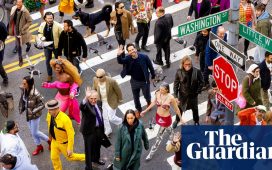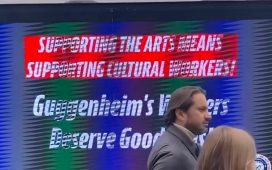“Hey Hey! Ho Ho! Homophobia has got to go!”
This was a chant from New York’s ACT-UP demonstration in 1989. Now the audio clip of this protest will echo throughout Greenwich Village in the coming month.
It’s part of Hear Me: Voices of the Epidemic, an audio piece that will play every night at 7pm in December at the New York City Aids Memorial, an open-air public space at the corner of West 12th Street and Greenwich Avenue in New York City. It starts on World Aids Day, 1 December.
“It’s an important day to remember, to reflect on the past, honor those we have lost and educate folks that it’s ongoing,” said Dave Harper, executive director of the New York City Aids Memorial. “We want to remind people the Aids epidemic is not yet over.”
According to a report from the Kaiser Family Foundation, 38 million people across the globe are living with HIV, with 1.7m new infections in 2019 (690,000 people died of Aids in 2019).
The audio piece features clips, organised chronologically, from famous speeches, songs, anthems, personal poems and protest clips, all of which shed a light on New York stories. “There are so many rich and vibrant oral histories in New York City, it’s a difficult but hopeful time in New York’s history,” said Harper.

There are clips from playwright Larry Kramer’s 1991 speech, where he says: “Forty million infected people is a plague! We are in the worst shape we have ever, ever, ever been in.” (Kramer, an LGBT activist, died earlier this year).
There are clips of speeches from activist Egyptt LaBeija from the Visual Aids 6th Annual Last Address Tribute Walk in 2018, who when speaking of Greenwich Village, said: “And to see this whole village transform into what it is now, is taking away the history of what this village was and should always be. The village is for us. Can I get an amen?”
The crowd roars: “Amen.”
“We wanted to create something that is living and breathing, that isn’t static,” said Harper. “The key was to include key historical figures who took part in the early days of the epidemic, alongside young vibrant voices from today.”
At 10am each day, the memorial will also feature a recording read by an art collective called What Would an HIV Doula Do?, a group of activists, friends and caregivers, and long-term survivors of HIV, who will read out the names of more than 2,000 New Yorkers who have lost their lives to Aids (over 100,000 New Yorkers have died from Aids).
“It’s important we say the names of people we’ve lost,” said Theodore Kerr, the project’s creative consultant.
These audio pieces are accompanied by an online component called A Time To Listen, a conversation series where selected experts reflect on candid clips from Aids history that helped inspire this project.
One of the most influential speeches as part of this project is Vito Russo’s speech Why We Fight, which is included in the montage that plays at 7pm throughout the month of December.
“To me, still to this day, it gives me chills,” said Harper. “It’s emotional to hear his voice, he did not live to see the memorial he built, the emergence of useful treatments for HIV. To look back on his words of anger and hopefulness, which are relevant not only to HIV, but the current pandemic we’re living through. Those folks never gave up.”
In his speech he says: “Someday, the Aids crisis will be over. Remember that. And when that day comes – when that day has come and gone, there’ll be people alive on this earth – gay people and straight people, men and women, black and white, who will hear the story that once there was a terrible disease in this country and all over the world, and that a brave group of people stood up and fought and, in some cases, gave their lives, so that other people might live and be free.”
Kerr says it’s important to look back on another epidemic. “With Covid-19, we can listen to these oral histories, and how people are living in the past and present, which helps us get through the current pandemic we’re living in.”
He also wants more of us to remember people are still living with HIV today. “I always ask, how do you memorialize an epidemic when it’s still ongoing?” asks Kerr. “People don’t talk about what young people with HIV have to deal with. In many ways, it’s difficult because both are not just wrestling with the virus but the history of HIV.”

One of the artists who is part of the collection is artist and writer Kia LaBeija, who reads a poem called Drafted which she wrote and recorded in 2017. LaBeija, who was born with HIV, writes about her mother in the poem, when she writes: “She found herself fighting a battle that she was destined to lose, but along with her smile, I inherited the thickness of her skin, the blood running through my veins, her only living will.”
“I wrote it in my bathtub, which is where I write everything good,” said LaBeija on the phone from Los Angeles. “I put out a lot of artwork about living in HIV, but I’m processing it in a public way, and at the time, I started feeling overwhelmed by it.
“But it eases my mind to think we’re all put on this earth for a reason,” she said, “By sharing my experience, I hope it can shift the narrative, shift people’s hearts or help someone in a similar situation.”
World Aids Day is a double-edged sword for people living with HIV, says LaBeija. “It’s a day where we can have conversations, honor those we have lost, and those who are still with us,” she said, “but I want people to keep talking about it on December second, third and fourth.
“We need to continue these conversations. Aids is an ulcer, it’s still a major crisis.”








